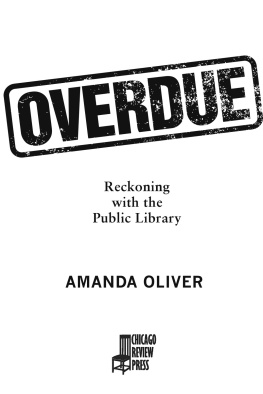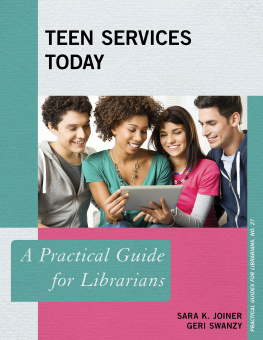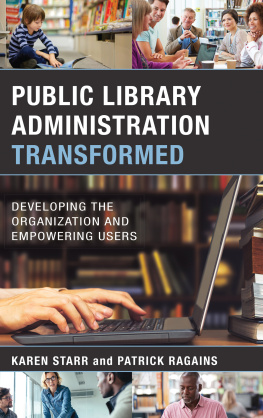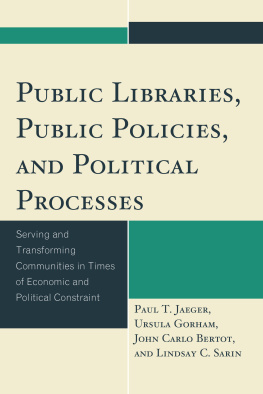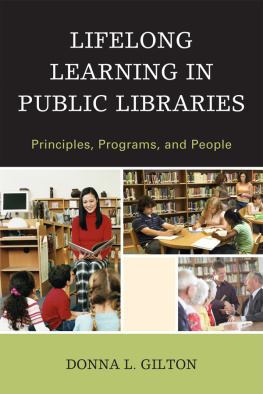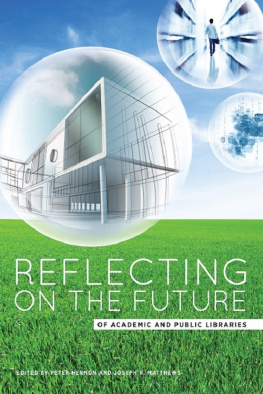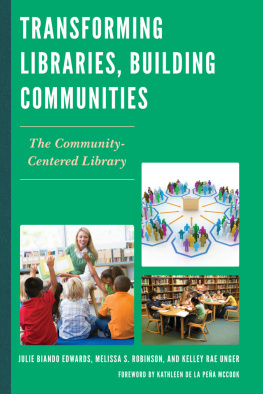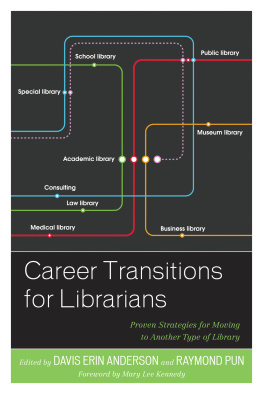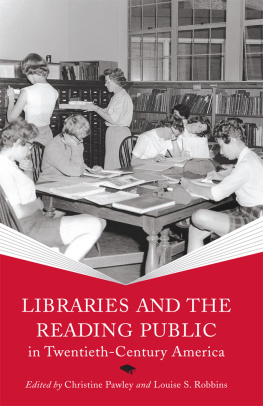Of course they needed to care. It was the meaning of everything.
Authors note
BY NOW I AM UNFAZED by the two familiar looks I see pass over peoples faces when I share that I was a librarian for nearly seven years. There are, I swear to you, only two reactions. One is amusement and it is instant. A smile cracks and their mouth is already open, moving with words I can easily predict:
My librarian didnt look like you.
Does the Dewey Decimal System still exist?
Oh wow, so you get to read all day.
Where are your glasses? (If I am not wearing them.)
Now the glasses make sense! (If I am wearing them.)
The other reaction comes with a slower smile and, if Im paying enough attention, a relaxing of their shoulders or a leaning in, like they instantly understand me better:
My friend/mom/cousin/uncle is a librarian and its such a fascinating job.
I always thought I might want to be a librarian. Maybe when I retire.
That is so cool. What kind of library?
I now respond to both reactions with the same summary: My job as a librarian was wonderful and also incredibly challenging (perplexed faces from the first group and encouraging or curious nods from the second). Libraries are not the same as they were when we were younger (perplexed faces from the first group and encouraging or curious nods from the second). Libraries are so much more than books, and librarians are so much more than the people who mind the books (you get it by now).
If I am tired, I lie and say, Yes, I did a lot of reading back then.
Librarians are not the outdated stereotypes that, somehow, still prevail on television, on podcasts, and in daily conversations: White women in cardigans and cat-eye glasses who wander spaces shushing patrons and placing books back on their shelves. Librarians are men, women, and nonbinary people. They are people of every race, though the field is still dominated by White librarians, especially in leadership roles. Most librarians are advocates. They are protectors and they are community resources. They are also citizens, community members, and individuals with their own personal experiences, morals, and biases that impact the communities they serve.
This book is everything I have to offer as evidence that many of our stories and understandings and beliefs around and about libraries and librarians are not only false but often damagingto the individual and collective histories of library spaces and the people who operate them, and also to our collective history as humans and to the stories and roles we ascribe to ourselves and our institutions, especially in America.
I cant imagine these pages being read without including a note that most of them were written during the COVID-19 pandemic, from March of 2020 to June of 2021. I wrote from a small desk I periodically moved around a four hundred-square-foot apartment in the Mojave Desert of California twenty minutes outside Joshua Tree. My view rotated from windows that faced east toward Goat Mountain and windows that faced west toward acres of government-owned land mostly untouched by humans. The soundtrack to these pages consisted of scrub jays, mourning doves, verdins, and winds that blew in with such force that the air in the apartment got thick with dirt and desert if I forgot to close the windows.
I did not have in-person access to many of the libraries and librarians I reference in these pages and, much more excruciatingly, while I was writing I did not see my family and closest friends or the places and communities I love and have relied on for internal and external guidance.
So many of us were stripped down to the rawest and most essential pieces of ourselves during this time. I wrote from that place, and ultimately, I think it was for the better. Where, and how, this book came together is steeped in the collective and individual grief and the many internal and external alterations that the COVID-19 pandemic created globally. I wrote in a place, in a time, in a way that necessarily, but often painfully, altered my fundamental ways of thinking not just about libraries and my time as a librarian but about the world and how I exist in it.
Within this book there are stories of marginalized people without access whose stories have been unheard or ignored, but they are not voiceless. No one is without a voice just because the majority have not been listening. I am not, nor would I ever try to be, a voice for the voiceless. I have included some details of patrons lives as I witnessed them and as they impacted my understanding of the relationship between libraries and their patrons. I write about them to the best of my abilities, research, and memories. It is not, and never will be, my place to tell patrons stories. Their stories belong to them.
For ease, I often use the broad words library and libraries to refer to public libraries, as opposed to the more typical inclusions (school, academic, private, and special libraries) under these words. During my tenure at the DC Public Library, we were told to refer to patrons or library users as customers, but I do not use that term here, preferring patron or library user instead. I use the words unhoused, houseless, houselessness, and experiencinghouselessness to describe people without secure and stable housing, unless I am directly quoting a person, title, or text. I do not believe anyone is homeless, which is to say that so long as people are alive they have a home within themselves, and I recognize that this home may be a precious anchor. Unhoused people may also have a physical home somewhere that they are unable to safely or comfortably return to and/or have strong memories of or ties to a home. I do not wish to lessen that connection.
I also want to make space here to acknowledge that the history I cover in these pages begins mostly in colonial America, during and after some of the countrys earliest violent colonizing of its original land and peoples. The true earliest forms of public libraries and librarians in this country belong to the many tribes and tribe members who still inhabit the land and uphold the values of shared storytelling through oral and written traditions that are arguably much more powerful than our modern concepts of writing, communication, and knowledge organization.
The names and identifying details of all patrons, coworkers, past partners, and officers have been changed within these pages. It is never my intention to purposefully harm anyone with my words, but I have been a reader, a librarian, a writera humanlong enough to understand that harm inevitably happens in writing, especially in nonfiction. No part of this book is intended to demonize, shame, or otherwise disparage specific persons, organizations, or institutions.
Nothing is too ugly for this world, I think. Its just that people pretend not to see.

